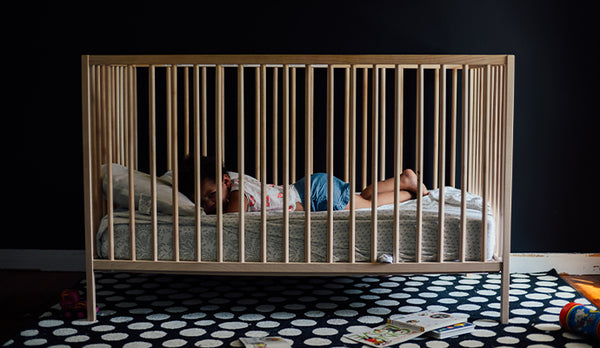
Resources: NPR, The New York Times, and Sleep.org
"Sleep training refers to various methods that are used to teach your baby to fall asleep on their own. Not only does sleep training help with bedtime, it also helps babies get back to sleep without help from you if they wake up in the middle of the night," Sleep.org. "Many babies start sleeping for extended periods at night by 6 months of age. If your baby is able to go long periods without feeding, but they're having trouble getting to sleep without your help, you may decide to try sleep training."
It's common for babies to experience sleep regression at 4, 6 and 8 months old. Sleep regression is when a baby who is already sleeping through the night suddenly struggles to settle down at bedtime or wakes fussing. Their sleep schedule becomes irregular. Trying different sleep training techniques is a great way to get them back on track!
Before beginning any training, make sure you and your child are following a regular schedule. Practicing pre-bedtime routines to calm baby, such as a bath, reading together, listening to relaxing music or playing white noise can reinforce going to sleep at bedtime.
Helping your child learn proper sleep habits early on will play a role in their development in the way of learning, memory, mood regulation, healthy immune system, metabolism and attention. Infants who are well rested will be happier and so will their parents!

Different Sleep Training Methods
Cry it Out - Though not always the gentlest approach, the 'cry it out' or extinction method is used by many parents. Crying it out means putting your child to bed and not coming back until the next morning, allowing them to cry themselves to sleep. If they wake up during the night, they must learn to self-soothe and go back to sleep on their own. Although it may be hard to listen to your baby cry, parents are instructed not to step in unless they believe the child may be ill, in danger or hurt.
Ferber Method - the Ferber or graduated extinction method is a softer approach to crying it out. Introduced by pediatric sleep expert Richard Ferber MD, parents slowly increase how much time they wait before checking in, when their baby cries at night. For example, at their first cry you should wait 2 minutes, the next cry 5 minutes, then 10, and so on. Make the checks quick and try not to pick baby up, instead calming them by rubbing or patting their back, and leave the room. If the child begins to cry again, you may reenter the room to soothe after waiting some amount of time.
Camping Out - Also known as the 'Chair Method,' the camping out method is done by gradually withdrawing your presence from your baby's room over the course of 1 to 2 weeks. On the first night, you should sit in a chair right next to baby's crib until they fall asleep and each night after move your chair further and further away, until eventually you are no longer in the room. The last few days can be done with you sitting outside the door but still within eyesight, and the very last day you sit out of sight but provide verbal reassurance if they fuss. Tell them everything is okay and that it is time for sleep. Allowing them to hear your voice helps them feel safe yet still allows them to learn how to self-soothe.
Bedtime Routine Fading - First record what time baby actually falls asleep every night no matter how late, this is their natural sleep time. Then begin putting them to bed a few minutes before that time, helping them associate falling asleep with being in bed. When they start falling asleep in bed quickly, begin to move their bedtime earlier by a 15 to 30 minute increment until it is the time you want.
"...If nothing seems to work, don't push too hard. For about 20% of babies, sleep training just doesn't work... says Jodi Mindell, a psychologist at Children's Hospital of Philadelphia," NPR. "Your child may not be ready for sleep training, for whatever reason," she says. "Maybe they're too young, or they're going through separation anxiety, or there may be an underlying medical issue, such as reflux."
Unfortunately, there is no easy or direct answer. Each child is different and you'll need to be flexible to determine whether more or less attention is needed to help your child learn to self-soothe and sleep independently.
Good luck! Be sure to check in with your pediatrician for more guidance on how and when to begin baby's sleep training.










Leave a comment